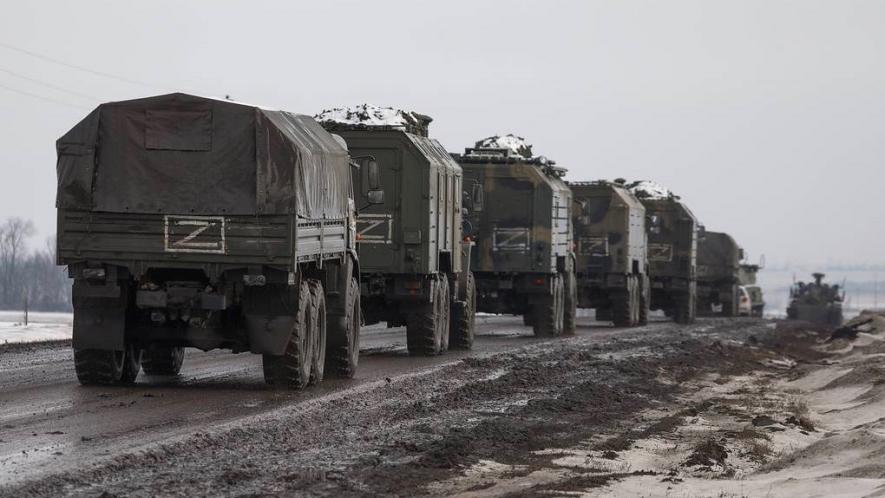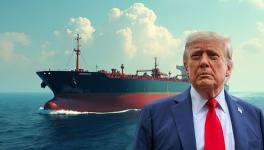Western Media’s Shock and Bias Ukraine-Russia Coverage

(Photo- Anton Vergun/TASS)
When two countries engage in a war, but it does not stir our own sense of patriotism or nationalism, we mostly consume all information on it we are provided and draw opinions accordingly. But in a globalised world, it is virtually impossible to remain unaffected by any war in which major world powers are directly or indirectly engaged. Besides, when the United States gets involved in a war, the entire western media begins to speak in unison. We hardly get to question the facts presented, for people generally consider western media credible. Due to the superficial impression that the western world is free and has a free press, most people tend to believe all the lies told to them are facts. When it comes to war, not just the media, even Hollywood joins the patriotic bandwagon and propaganda machine.
Consider the comment most people repeat: war is undesirable for it causes suffering, death and destruction. Of course all war is undesirable. Still, hardly a year passes without conflicts between countries. Ever since the Second World War, the frequency of wars which cause ever-greater destruction and loss of life has only increased. Ironically, most nations tend to preach non-violence and peace as the most desirable human values. Whereas a longer view of history shows war has been the most frequent event in the world. Maybe the western world is highly democratic and peace-loving, but it is ruthless when it comes to the global economic order. Through direct or indirect control over international institutions that regulate the world, it dictates terms to the Global South. (Though Russia and China are altogether different propositions!)
For understanding current events, we must make sense of the world after the Second World War. Two new world powers emerged, the United States and the Soviet Union. The former claimed to be a free world, and the latter was labelled Iron Curtain. Soon, led by the United States, the North Atlantic Treaty Organisation (NATO) came to exist to prevent the Soviet Union from expanding to the West. In reaction to the formation of NATO, the Soviet Union created the Warsaw Pact bloc. Thus began the Cold War, which lasted almost forty years until the Soviet Union collapsed in 1991, followed by its disintegration and the emergence of many new countries.
These developments made both NATO and the Warsaw Pact irrelevant, and the latter was discontinued. But even though NATO lost its purpose, the United States never took any initiative to disband it. Instead, it began adding more and more erstwhile Warsaw Pact countries to the grouping. Over time, the United States developed economic stakes in some of these countries, including Ukraine, a non-NATO country. Currently, we have the European Union, which is primarily an economic bloc, and NATO, the military bloc of western countries led by the United States.
Despite the Soviet Union’s collapse and the emergence of new nations, Russia has remained a major player owing to its vast size and resources. It is wrong to assume Russia is weak or its military engagement with Ukraine is a full-scale war. Russia has always been sensitive to its security concerns, and its major threat is from NATO, which has continued to expand toward eastern Europe. Russia would always like buffer countries between its borders and NATO countries.
Put another way, Ukraine’s decision to join NATO has triggered this conflict. As a matter of fact, we can see that the United States and its NATO allies are waging war against Russia. Almost all resources to carry out this armed conflict are being provided by the United States and other western countries. Further, western participation is not confined to providing arms and financial help to Ukraine but much more. The Russian news channel Russia Today has reported that the West has imposed more than seven thousand sanctions against Russia. Not only that. The matter has been brought to the International Court of Justice, with accusations against Russia of war crimes. It does not require much mental engagement to discern the implications of these obvious occurrences.
Simultaneously, the western world is attempting, quite successfully, to influence people’s perceptions by projecting Russia in a particular way—and it is not doing this for the first time. Central to what the West is doing is constructing Vladimir Putin as the dictator and culprit, even though Russia claims it is a democratic country. One is reminded of what happened in Iraq when the United States under George Bush similarly painted Saddam Hussain as dictator and culprit. We now know there were no weapons of mass destruction in Iraq at the time.
The binary of free democratic countries versus dictatorships does not hold, for the West has supported many dictators. Obviously, behind all this, one must look for Western nations’ economic stakes in certain countries. In the western view, Russia, rich in oil and gas resources and with an indomitable position in the world, represents a threat.
When it comes to the media, the construction of a dictator as the enemy may not be subtle, but if we closely watch western news channels, an interesting politics of representation emerges. Instead of informing people about events in this war, it is concentrating on the suffering of individuals and their families in Ukraine. We know ordinary people suffer during a conflict, but when stories of individuals and families occupy central space in the news, the primary purpose is to create hatred against the invader.
The western media can use this strategy in different ways. A classic example is the anti-Vietnam war movement in the United States. Opponents of the war started narrating the exact details of each American soldier in demonstrations instead of just saying how many soldiers had been killed. Similarly, these days, by watching personalised stories on TV, people feel appalled—not with war but of Russians in general and Putin in particular. When this happens, we forget such information (about ordinary peoples’ suffering) was utterly missing during America’s invasion of Iraq. Only later were we horrified when the actions of American soldiers came to light. However, the vital thing to remember is that Russia is waging war for its security against ever-expanding NATO domination.
The author was a professor of sociology at Guru Nanak Dev University, Amritsar, and is a former president of the Indian Sociological Society. The views are personal.
Get the latest reports & analysis with people's perspective on Protests, movements & deep analytical videos, discussions of the current affairs in your Telegram app. Subscribe to NewsClick's Telegram channel & get Real-Time updates on stories, as they get published on our website.























